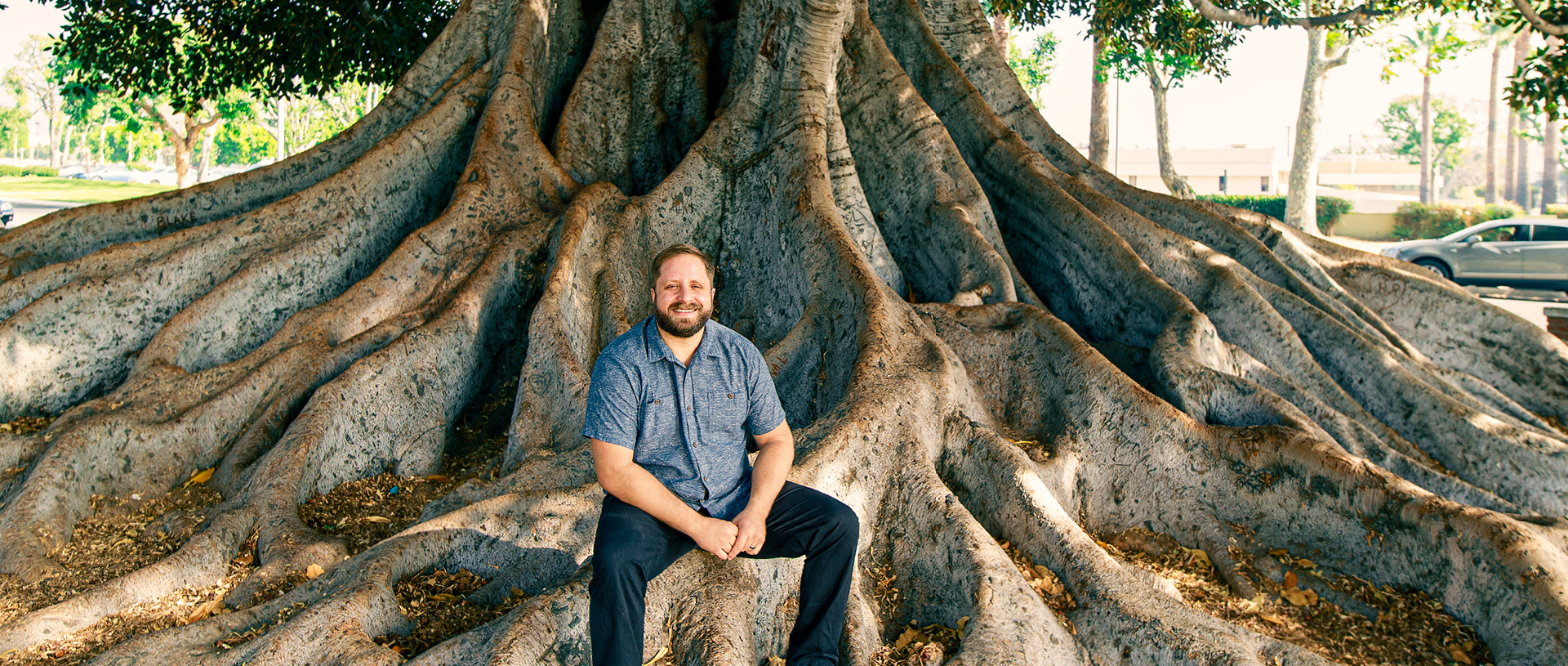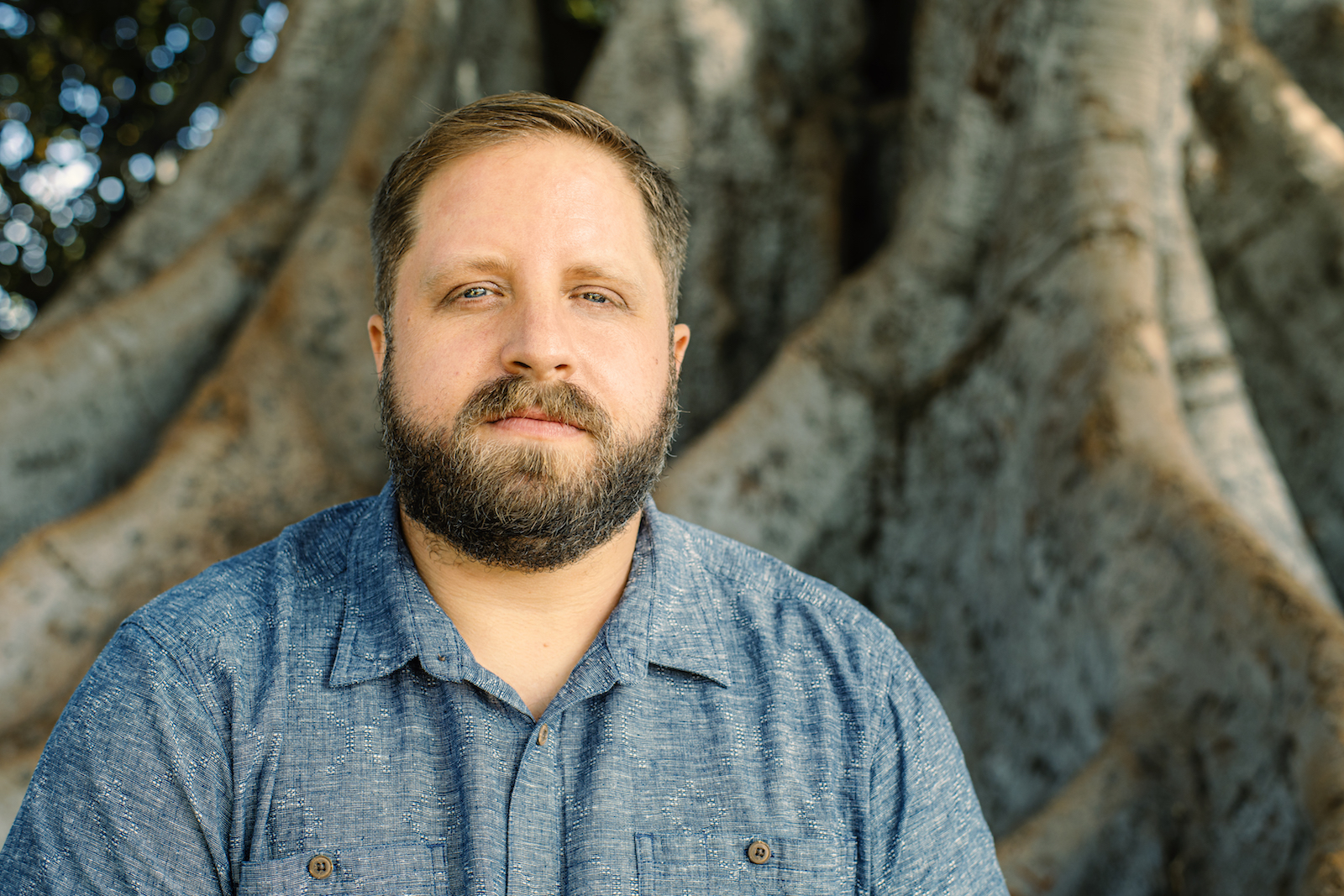
In kindergarten, Cameron Keirnes (MSMFT ’14) participated in a daily ritual that became seared into his memory. At the end of the school’s hallway, all of the children deemed “normal” would veer to the left, while those with one disability or another were herded to the right. “Every morning I’d have to take a right,” he recalls, “and all of my friends would have to watch me go.”
Diagnosed with Attention Deficit Hyperactivity Disorder (ADHD) at just four years old, Cameron was among the first generation of children put on specialized medications and Individualized Education Programs (known as IEPs). Though internally he felt no different from his peers, the distinction was made abundantly clear to him in that fluorescent-lit hallway.
By the time he graduated from Fuller’s Marriage and Family Therapy program decades later, this once-vivid memory had become somewhat latent. That changed when Cameron began working as a developmental specialist at Real Connections Institute, a Los Angeles-based company that provides developmental services to children on the autism spectrum. “I had been trying to minister to individuals who had dysfunctional family situations,” he says, “but then I met this other population, and they actually connected with me more.” Like the kindergarten version of Cameron, his clients exhibited a self-perception of being inherently less than.
To counteract this ingrained sense of inferiority, when interacting with autistic individuals Cameron takes the approach of presumed competence. In his words, it is “the assumption that they’re whole and good, regardless of what you always see on the outside.” It wasn’t until he learned about and began employing this concept that Cameron’s vocation—and internal healing—was set in motion. To borrow Frederick Buechner’s famous axiom, this path showed itself to be the very place where Cameron’s deep gladness would meet the world’s deep hunger.
To Cameron, presumed competence is inextricably linked to the theological concept of imago Dei, or the belief that human beings are made in the image of God. These twin truths inform every aspect of Cameron’s practice, especially his approach to therapy. He laments the fact that in his field, the dominant therapy is one based on the same theory used for dog training; that is, rewarding desired behaviors with positive reinforcement while punishing behaviors deemed disagreeable with negative reinforcement. To him, the issue with this line of thinking is obvious: aside from being far more complicated than dogs, human beings are uniquely bestowed with the divine imprint and deserving of treatment that acknowledges their God-given dignity.
At Real Connections, where Cameron now serves as executive director, the staff employ a lesser-known approach called the Developmental, Individual Difference, Relationship-based Model, or DIR®/Floortime™, an evidence-based intervention that focuses on fostering a child’s social, emotional, and intellectual development as opposed to isolating specific behaviors or skills. By following the child’s lead and emphasizing the tenets of respect, play, and joy, this approach promotes healthy engagement with others as well as the self. Rather than observing from their own standpoint, parents, caregivers, and mental health professionals get on the autistic child’s level—which, as it turns out, often involves spending some time on the floor.

Claire Mainprize (MAT ’20) is a freelance writer and editor based in Colorado’s Front Range.

Nate Harrison is Director of Photography and Senior photographer. His personal work can be found at NateCHarrison.com
In kindergarten, Cameron Keirnes (MSMFT ’14) participated in a daily ritual that became seared into his memory. At the end of the school’s hallway, all of the children deemed “normal” would veer to the left, while those with one disability or another were herded to the right. “Every morning I’d have to take a right,” he recalls, “and all of my friends would have to watch me go.”
Diagnosed with Attention Deficit Hyperactivity Disorder (ADHD) at just four years old, Cameron was among the first generation of children put on specialized medications and Individualized Education Programs (known as IEPs). Though internally he felt no different from his peers, the distinction was made abundantly clear to him in that fluorescent-lit hallway.
By the time he graduated from Fuller’s Marriage and Family Therapy program decades later, this once-vivid memory had become somewhat latent. That changed when Cameron began working as a developmental specialist at Real Connections Institute, a Los Angeles-based company that provides developmental services to children on the autism spectrum. “I had been trying to minister to individuals who had dysfunctional family situations,” he says, “but then I met this other population, and they actually connected with me more.” Like the kindergarten version of Cameron, his clients exhibited a self-perception of being inherently less than.
To counteract this ingrained sense of inferiority, when interacting with autistic individuals Cameron takes the approach of presumed competence. In his words, it is “the assumption that they’re whole and good, regardless of what you always see on the outside.” It wasn’t until he learned about and began employing this concept that Cameron’s vocation—and internal healing—was set in motion. To borrow Frederick Buechner’s famous axiom, this path showed itself to be the very place where Cameron’s deep gladness would meet the world’s deep hunger.
To Cameron, presumed competence is inextricably linked to the theological concept of imago Dei, or the belief that human beings are made in the image of God. These twin truths inform every aspect of Cameron’s practice, especially his approach to therapy. He laments the fact that in his field, the dominant therapy is one based on the same theory used for dog training; that is, rewarding desired behaviors with positive reinforcement while punishing behaviors deemed disagreeable with negative reinforcement. To him, the issue with this line of thinking is obvious: aside from being far more complicated than dogs, human beings are uniquely bestowed with the divine imprint and deserving of treatment that acknowledges their God-given dignity.
At Real Connections, where Cameron now serves as executive director, the staff employ a lesser-known approach called the Developmental, Individual Difference, Relationship-based Model, or DIR®/Floortime™, an evidence-based intervention that focuses on fostering a child’s social, emotional, and intellectual development as opposed to isolating specific behaviors or skills. By following the child’s lead and emphasizing the tenets of respect, play, and joy, this approach promotes healthy engagement with others as well as the self. Rather than observing from their own standpoint, parents, caregivers, and mental health professionals get on the autistic child’s level—which, as it turns out, often involves spending some time on the floor.
Claire Mainprize (MAT ’20) is a freelance writer and editor based in Colorado’s Front Range.
Nate Harrison is Director of Photography and Senior photographer. His personal work can be found at NateCHarrison.com


When explaining the significance of this method, Cameron turns to metaphor: “If a person is a tree, the behaviors are the leaves that come out of the trunk and the roots. We’re trying to focus on the roots,” he says, which are “the things that are going on inside of them, the physical dysregulation they have, the sensory profile they have that causes them to do the things they do. Ultimately we are just trying to help them thrive on their own terms, rather than tell them the behaviors they need to do.”
Unfortunately, such services are hard to come by. Although society has become increasingly curious about autism, and representation of the disorder has recently been amplified in popular media, few other spaces have been erected in which the autistic community can thrive.
That is precisely why Cameron’s newest endeavor is joining other like-minded experts in his field to advocate for nationwide coverage of developmental services. Backed by a larger company called Positive Development, his sights are set on a simple yet lofty goal: “To make our therapy affordable for all, not just the privileged.”
The initiative is a tangible example of his “walk the walk” mentality: “I don’t think advocacy is about going out there and thinking good thoughts,” he says. “Advocacy is taking the risk to build something that you believe.”
The process of tearing one thing down, building another, and performing seemingly endless renovations is a familiar one to many seminary students. “Fuller brings in individuals who are willing to deconstruct their assumed spaces within themselves,” Cameron says, “and if you’re going to challenge ideologies that support ableism, you’re going to need to go through a process of deconstruction.”
Through Fuller’s biblical training and his own dismantling process, Cameron came to realize that the Bible’s cast of characters includes a host of neurodiverse individuals, all bearing various labels depending on humanity’s collective cognition at the time. This bolstered his now deeply held notion that autism is neither a mistake nor a result of the Fall, but “something that we need in our society.” The contribution that the typical pattern of autism has made to humanity is—in Cameron’s opinion—“almost unanimously positive.”
Moreover, Scripture has shown Cameron that throughout history, God has repeatedly recruited the lowly to be agents of divine work—and that the very people society initially writes off as outcasts can become its wise sages, brazen prophets, and bearers of the good news.
This age-old pattern is epitomized in Jesus’ declaration that the last shall be first and the first shall be last. Cameron has so internalized these words that they have become more than a verse to quote; rather, they form his life’s guiding principle. “The normative system causes people to be left out,” he says. “When Christ came to this earth, he didn’t surround himself with normative people.” In fact, “he came to challenge the normative system.” To Cameron, it all evidences the topsy-turvy nature of the kingdom of God.
Giving credence to that kingdom economy, Cameron will tell you that the greatest ministry he ever received was from a nonverbal autistic friend. During visits to this man’s home, Cameron began to take note of the inhumane ways fellow visitors treated him—from family members talking about him as if he weren’t in the room to hired caregivers playing games on their phone rather than engaging even at the most basic level. Cameron notes that, sadly, such interactions are far from anomalous in the daily life of someone with severe autism.
One day, Cameron allowed some of these vexations to float to the surface. “I said, ‘Hey man, it’s really hard for me to watch how people don’t see you as a whole person. How do you get through it?’” From his iPad, his friend calmly typed out a reply. When he turned the device back to Cameron, the screen displayed the following words: “When you look at the person of Jesus, he showed grace to those who hurt him.”
“It completely rocked me in that moment,” Cameron says. “This is someone who has absolutely no incentive in selling me a line about who Jesus is. Every single day he is living this experience of not being treated like a human and all he had to say was, ‘I want to treat them with grace because Jesus treated them with grace.’ I remember thinking, ‘You’re the greatest minister I’ve ever met’—like, forget Billy Graham, forget everyone else.”
The willingness to reach this level of mutual vulnerability with those who have different abilities than oneself is something noticeably absent from the majority of interactions Cameron witnesses. The key to cultivating such fruitful relationships, he believes, is that engagement must be based on presumed competence. “Not only are you honoring them, but you’re honoring yourself,” he says. “We all have ways that we’re not as able as those around us, and when we embrace those who are different, we accept the different parts of ourselves.”
This should feel like a risk, Cameron says, and if it doesn’t, his answer is to “try again.” It should be vulnerable, he says, because “there’s a vulnerability to loving your neighbor.” In this environment alone, “love can grow, care can grow, trust can grow—and I think that’s what these communities need,” he says. “They need to be treated like everyone else.” Cameron’s hope is that in all aspects of advocacy for the autistic community, the values leading the way are vulnerability and risk. “I mean, that’s everything. That’s my tagline.”
Ministering to young people of color in the church, Jeff Liou creates space in which they can belong and thrive